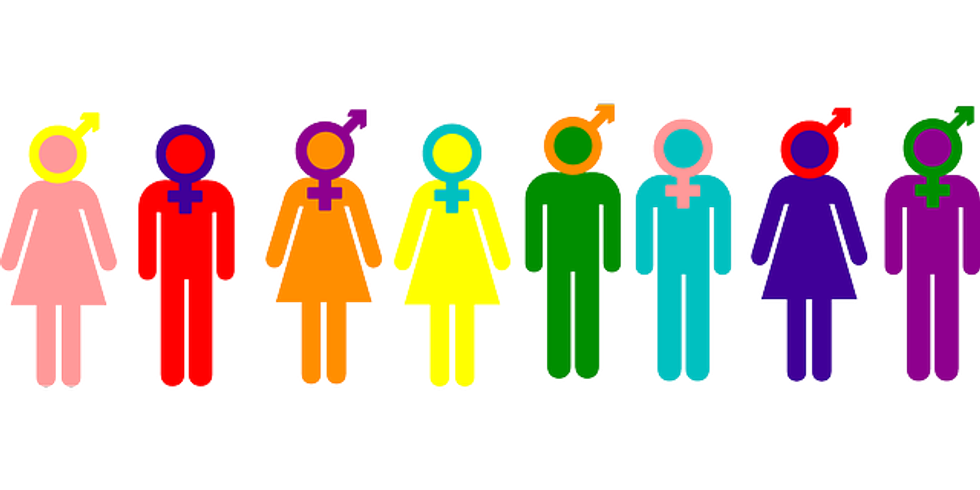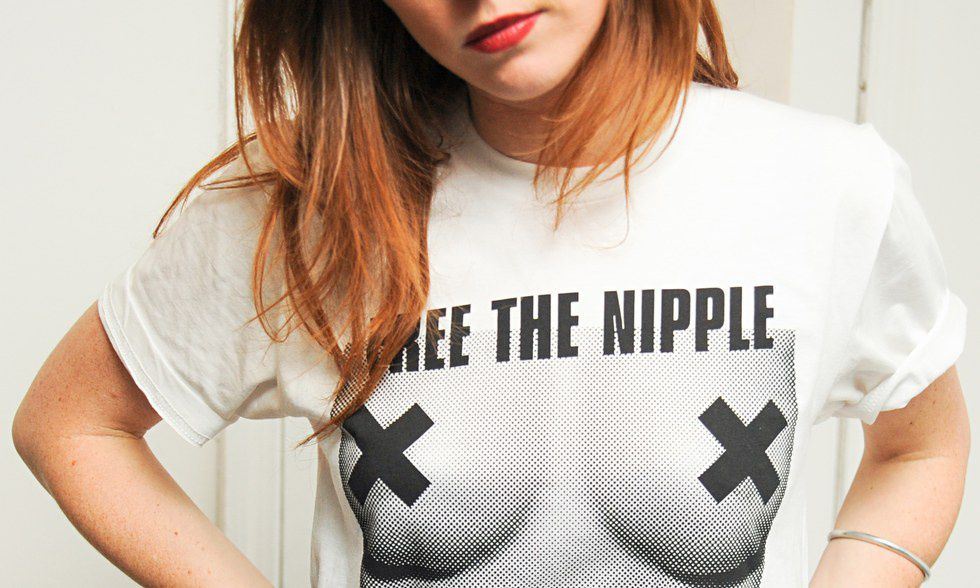Lately on the internet, there has been a lot more buzz about women letting their armpit and leg hair grow out. Many of my friends have been doing this for years, some even participating in the colorful practice of dying their underarm hair, and lately I've noticed a few more jumping on the bandwagon. Although letting body hair grow out is by no means a new trend or idea, it is one that I believe is very important for all genders to acknowledge as an acceptable practice.
Since Ancient Egyptian times, women have been removing their body hair. Women used tweezers made of shells, sugar-based waxes, and beeswax to do this. In the Roman Empire, it was a signature of class to be hairless; the wealthier used razors, tweezers, creams, and stones to remove body hair. These trends varied across the world and not all groups practiced them. In the 1700's, some women used a straight razor to shave, but generally hair was not fussed over. These trends really gained momentum here in America in 1915 when Gilette created the first razor specifically made for women after providing razors for men in the army and wanting to extend their reach. Ads by this point had already begun circling about body hair being "humiliating" for women, and this combined with the new trend of short sleeve dresses was the perfect combination for a shaving trend. This same year, Harper’s Baazar published an ad of a woman without armpit hair, the first of its kind. By the early 20's, armpit hair on women had widely disappeared, and leg hair was next on the list of large companies as hemlines began to rise. By the 40's, the first women's electric razor was released. There was a shortage of nylon due to the war, and more products became available for hair removal. Between that and the fact that skirts were getting shorter, the importance of removing leg hair as well was enforced. By the 1950's, body hair removal became more widely accepted.
Although when these trends started in America I'm sure some women preferred them, that doesn't mean all of them did. Society and its marketing probably thrust this upon some women as the "proper" way to perform our gender.
The issue with putting gender into a box like this and shaming women who do something outside of the "norm" for their gender is that gender is on a spectrum. Humans are diverse and complicated creatures and there is more than one way to be a human regardless of how feminine, masculine, or neutral that person behaves. These trends define what is the acceptable way, at that time period, to "properly" perform a gender, in this case in relation to body hair, but humans can't fit in these boxes. If it was 1700 right now, women wouldn't be shaving as extensively as we do now and that would be socially accepted. That was the current trend, and therefore, the norm and expectation. The boxes, or expectations, change with the trends. Sometimes body hair is in fashion and sometimes it is out.
It is crucial that at this time, we support females who are letting their body hair grow. Sure, this may be uncomfortable to some people who aren't used to seeing this or being around it, but that's because society hasn't accepted this as the norm here in over a century despite the fact that it is biologically normal. Ultimately, we need to remember that it is that individual's body and therefore that individual's choice regardless of how that gender is "supposed to behave", a concept I loathe. This idea of individual choice is a constant issue with all kinds of lady things including decisions as big and controversial as abortions. By telling a person they should make certain choices about their body and shaming them if they do or don't, we are oppressing them, regardless of gender. I believe this is applicable to females shaming females as well, something one oppressed gender shouldn't do to those of the same gender facing the same issues. Of course the experience within a gender varies depending on many individual aspects like race, education and socioeconomic background, but when females shame other females for their decisions, it reinforces patriarchal standards that have been ingrained into our minds consciously or subconsciously. We are helping maintain the inequality when we do this. Additionally, shaming another regardless of gender is reinforcing societal norms which are often rooted in sexism like the concept that men have to be tough and aren't allowed to have feelings and women can't be sexually empowered without being slutty. Do you want to perpetuate that?
By encouraging individual choices, we as a society reinforce that gender is on a spectrum. By doing that, we acknowledge and more easily recognize the existence of those who do not identify with more traditional genders like male and female. These people identify elsewhere on the spectrum or maybe don't identify at all. People don't deserve to be forced into a societal box of "right" and "wrong" because really, there is no such thing outside of a social context and humans are humans regardless of gender.
Shame tends to be a huge part of the female experience. Women are shamed for their natural bodily functions constantly ranging from periods and pregnancies to hair growth. These processes are outside of a woman's control and if she chooses to let her body function how it does without the outside influences of things like birth control and razors, then all the power to her. It is her choice. There is nothing disgusting about a menstrual cycle and there is nothing disgusting about body hair which the female body naturally grows. Those who shame them are perhaps not used to seeing or hearing about these things, so by exposing these people to the female body behaving as it does naturally, we are demystifying these topics. That can turn them from taboo to everyday and common. I believe this concept is also applicable to female nipples in that if we accepted their exposed presence as the norm, it would demystify that body part and therefore desexualize it.
Part of women's oppression has been the idea that we are to cover up where men don't have to and we are to hide these processes and not talk about them. The inaccurate idea that these things are disgusting, humiliating, and secretive probably contributes more than we'd like to think to gender inequality. I believe, if this is third wave feminism, that this is definitely the time to address these social norms and break them. Women should be able to talk about their bodies without shame from any of the genders and women should be able to exist in our natural hairy states if we so choose like men do. No one cares if guys have underarm hair or hairy legs so why should it be different for the other half of the humans in a society?
Of course there will always be trends, but shaming those who don't follow them is like making fun of someone for wearing Aeropostle instead of Hollister in seventh grade; ultimately it doesn't matter and is none of your business anyway. Additionally, while accepting female humans growing their hair, we also need to recognize that people identifying with other gender roles should also have these options with their bodies. If a person identifying with the male gender wants to shave his body hair in places where it is more traditional for them to not, we should not only accept that but encourage it as it is their choice. Breaking norms requires a lot of courage.

Women breaking these norms today are being brave. Some are even going one step further and dying their underarm hair different fun colors which only reinforces their courage. This unapologetic, extra attention-drawing practice is a huge progressive statement for women in this country. It shouts "my body, my choice." exactly the kind of statement we need to continue making to gain more equality in this country. By going against social norms and taking back the female body's natural state from society's rules, this penetrates the deep web of oppression women have been facing for forever. Although it may only be one string in that intricate web of double standards and rules, it is definitely a step in the right direction towards its deconstruction. It might take time; fighting women's oppression is probably going to have to be a piece-by-piece battle since it is so deeply rooted in our society. However, I believe this is one of the pieces and we are on the right track, especially if this can be looked at more objectively and with a sense of empowerment rather than judgement.
By embracing this newer trend, we are accepting people for who they are and how they choose to present themselves and exist. This could create a more accepting and loving world. It is your body, and therefore, it should be your choice. By accepting the individual's choice of how they shave regardless of gender, we detach hair removal trends from the performance of gender which ultimately frees the individual from that gendered part of society's oppressive ways.




























